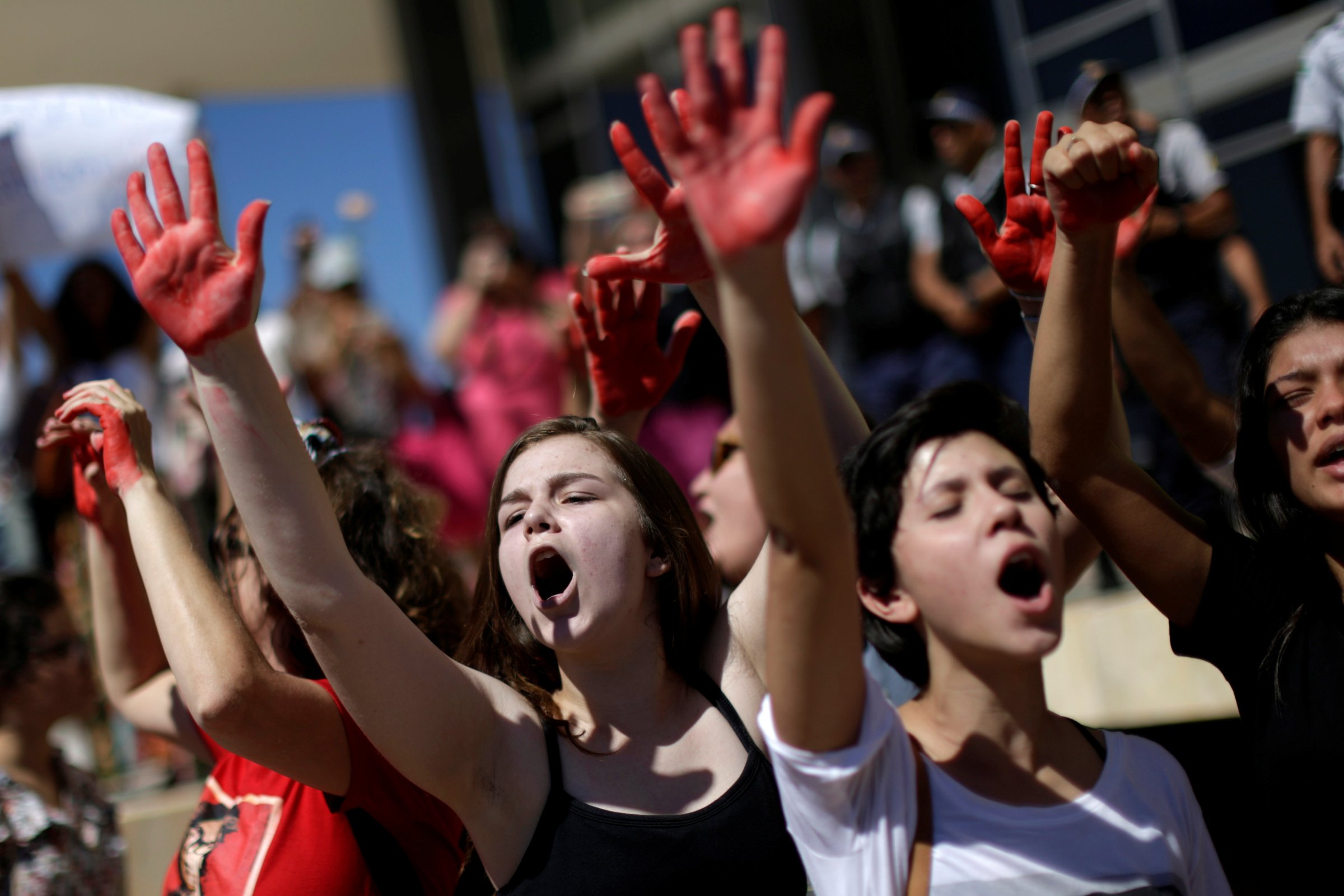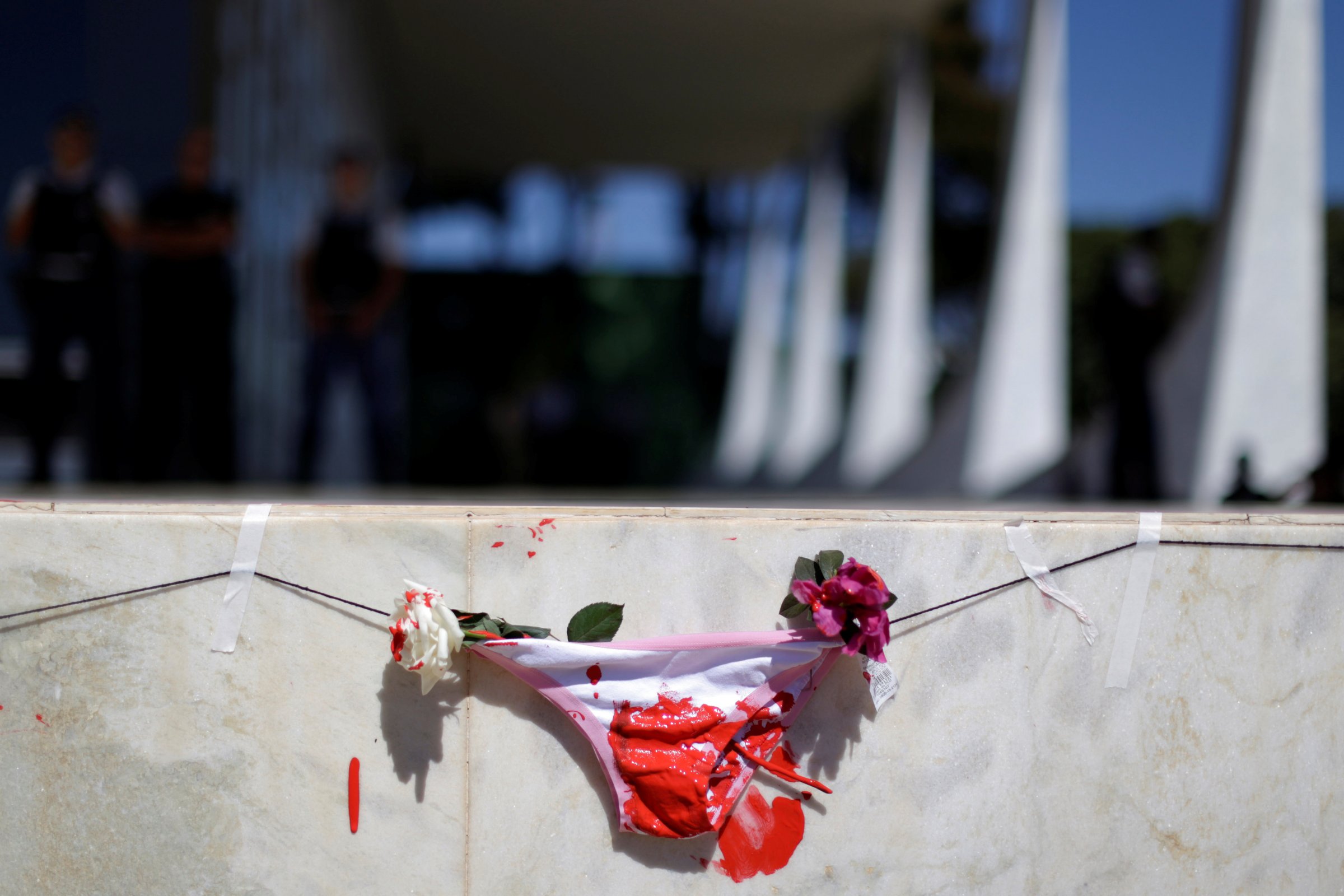 Reuters/Ueslei MarcelinoDemonstrators attend a protest against rape and violence against women in Brasilia, Brazil, May 29, 2016.It was a crime that shocked Brazil and made headlines around the world. A graphic video and photo posted online last week showed a 16-year-old girl, stripped, bloodied, and unconscious after being apparently raped by more than 30 men in a favela in Rio de Janeiro.
Reuters/Ueslei MarcelinoDemonstrators attend a protest against rape and violence against women in Brasilia, Brazil, May 29, 2016.It was a crime that shocked Brazil and made headlines around the world. A graphic video and photo posted online last week showed a 16-year-old girl, stripped, bloodied, and unconscious after being apparently raped by more than 30 men in a favela in Rio de Janeiro.
But the girl's suffering didn't end there, revealing the extent of Brazil's problem with violence towards women and its culture of victim-blaming.
Her voice distorted to hide her identity, she told a primetime magazine TV show on the weekend how she received death threats in the misogynistic backlash that followed, and which also included accusations that she is a gangster's moll who takes part in orgies in exchange for drugs.
"I can't leave home. On Facebook, I had 900,000 messages," she said. "They said if I went to some community or other, I was going to die."
As police investigate, the teenager has become the pixelated face of a campaign against rape culture in a country where a woman is raped every three hours. Demonstrations were held in Rio and Sao Paulo on Friday. Tens of thousands are expected to take to the streets in simultaneous protests across the country this Wednesday in support of the thousands of Brazilian women raped every year who are then often shamed and blamed by society and the authorities.
"The very police officer blamed me," the victim said in the TV interview broadcast on Sunday night. "He put the photos and video on the table. He showed them and just said: 'Tell me then.' He just said that. He didn't even ask if I was okay."
At the same time as strangers flooded the girl's Facebook page with insults, the then lead investigator appeared to encourage mistrust in the girl's account.
"The investigation has to be a little more technical to determine whether there was really a rape," police chief Alessandro Thiers told at a press conference on Friday.
This was despite the video showing a man assaulting the girl's unconscious body while another voice said she had earlier been raped by "more than 30." Another man is heard saying: "Look how it is. Bleeding. Look where the train passed." A selfie posted on Twitter showed a man in front of the girl's naked, and apparently drugged, body.
 Reuters/Ricardo MoraesDemonstrators attend a protest against rape and violence against women in Rio de Janeiro, Brazil, May 27, 2016.
Reuters/Ricardo MoraesDemonstrators attend a protest against rape and violence against women in Rio de Janeiro, Brazil, May 27, 2016.
The girl's lawyer, Eloisa Samy, also claimed that Thiers had asked the victim whether she had "a habit of participating in group sex," and whether she had been "co-opted by drug traffickers to work with them."
"When the very officer in charge of the investigation into a case of gang rape positions himself with the clear intention of criminalizing and blaming the victim, even with all the media attention, it is easy to see what makes so many women — victims of rape and sexual violence, ignored by the media — fail to report their attackers," Samy said in a post on Facebook. Samy is no longer representing the girl, who has entered a police protection program.
Meanwhile, a public outcry over Thiers's alleged conduct has seen him taken off the investigation.The new lead investigator, Cristiana Bento, told reporters on Monday that the video did show the girl being raped and featured a man who said she had earlier been raped by "more than 30" men.
Bento also said that physical tests were carried out too late to provide any conclusive evidence but that when it came to sexual assault, the victim's word carried more weight than that of the suspects.
"She was the victim of sexual abuse and she's being victimized and judged here," Bento said. "This girl should be looked after. I want to identify all of them and take all the material needed to convict them to the public prosecutors."
Since the dramatic change in police attitude towards the case, four of the six identified suspects are now considered to be on the run. A seventh has been identified and two have been arrested, including the girl's alleged 20-year-old boyfriend.
 Reuters/Ricardo MoraesA woman attends a protest against rape and violence against women in Rio de Janeiro, Brazil, May 27, 2016.
Reuters/Ricardo MoraesA woman attends a protest against rape and violence against women in Rio de Janeiro, Brazil, May 27, 2016.
Even so, Bento said the victim is no longer willing to talk to police.
"She's afraid to talk. It's understandable," the investigator said. "It's clear the victim is under pressure."
Bento added that the girl had only spoke to police in the first place because the images surfaced. She also said that drug traffickers in favelas regularly rape girls with impunity, because the victims are too scared to speak up.
Government figures showed eight reported rapes a day last year, but the figures only related to those who called the national hotline for offences against women, Disque 180. The real figure is likely to be much higher.
UN Women in Brazil, a division of the UN dedicated to gender equality, highlighted the most recent case alongside that of another teenage victim, who was reportedly drugged and raped by five men in the northern state of Piaui in the same weekend.
"As well as being young women, these barbaric cases are similar in that the two adolescents had been attracted by their torturers in premeditated plots and have been violently attacked in the context of illicit drug use," said Nadine Gasman, of UN Women in Brazil. "UN Women calls for zero tolerance from Brazilian society to all forms of violence against women and its trivialization."
On Friday, hundreds of protesters turned out to demonstrate against rape culture in Rio, with banners and chants that said: "Mess with one, mess with all of us."
"It's not acceptable to be quiet about this," said 24-year-old student Paloma Oliveira, one of the organizers of the "No to Rape" protest. "Rape is rape. It's a brutal crime. For me, there's a need to fight against machismo. All of us know we are victims of different abuses but we don't talk about it because it's become normalized."
Another wave of protests across the country planned for Wednesday, and called "For all of them," is expected to attract bigger crowds. Organizers expect more than 20,000 to attend the demonstration in Rio alone.
"I am very sad to have to get to the point of a woman being raped by 30 men to cause all this commotion, because it happens every day," said Laura Nunes, one of the organizers. "This case is the exact representation of what happens in Brazil."
Nunes said the fight to end rape culture and violence against women was now facing additional challenges since the current interim government took office after the suspension of President Dilma Rousseff earlier this month.
But though acting president, Michel Temer, failed to name a single woman in his cabinet, he was quick to respond to the gang rape in Rio.
"It is absurd that in the 21st century we have to live with barbaric crimes like this," he said in a statement. "Our government is mobilized, along with the Department of Public Security of Rio de Janeiro, to establish responsibility and punish harshly the perpetrators of the rape and the dissemination of the criminal act on social networks."
 Reuters/Ueslei MarcelinoWomen's underwear smeared with paint is seen during a protest against rape and violence against women in Brasilia, Brazil, May 29, 2016.
Reuters/Ueslei MarcelinoWomen's underwear smeared with paint is seen during a protest against rape and violence against women in Brasilia, Brazil, May 29, 2016.
Temer also called a meeting with public security secretaries from around the country to discuss ways to combat violence against women.
A number of key political figures have also expressed support for a campaign launched by Facebook called, "I fight for the end of rape culture." They include Rio's mayor, Eduardo Paes, who has been accused of hypocrisy given his support of Pedro Paulo Carvalho as his potential successor. Carvalho has admitted to hitting his wife during an argument.
The outrage sparked by the current horrific rape case shows just one aspect of the wider problem of violence against women in Brazil. Government figures suggest more than 13 million women have been victims of domestic abuse, and a woman is killed every two hours on average.
Before deleting her Facebook account, the victim herself thanked the public for their support, adding that it "is not the uterus that hurts but the soul because there are cruel people going unpunished."
In her TV interview on Sunday the girl was asked what she would wish for her attackers. "A daughter," she replied.
Read the original article on VICE News. Check them out on YouTube, Facebook, and Instagram. Copyright 2016. Follow VICE News on Twitter.












Comments